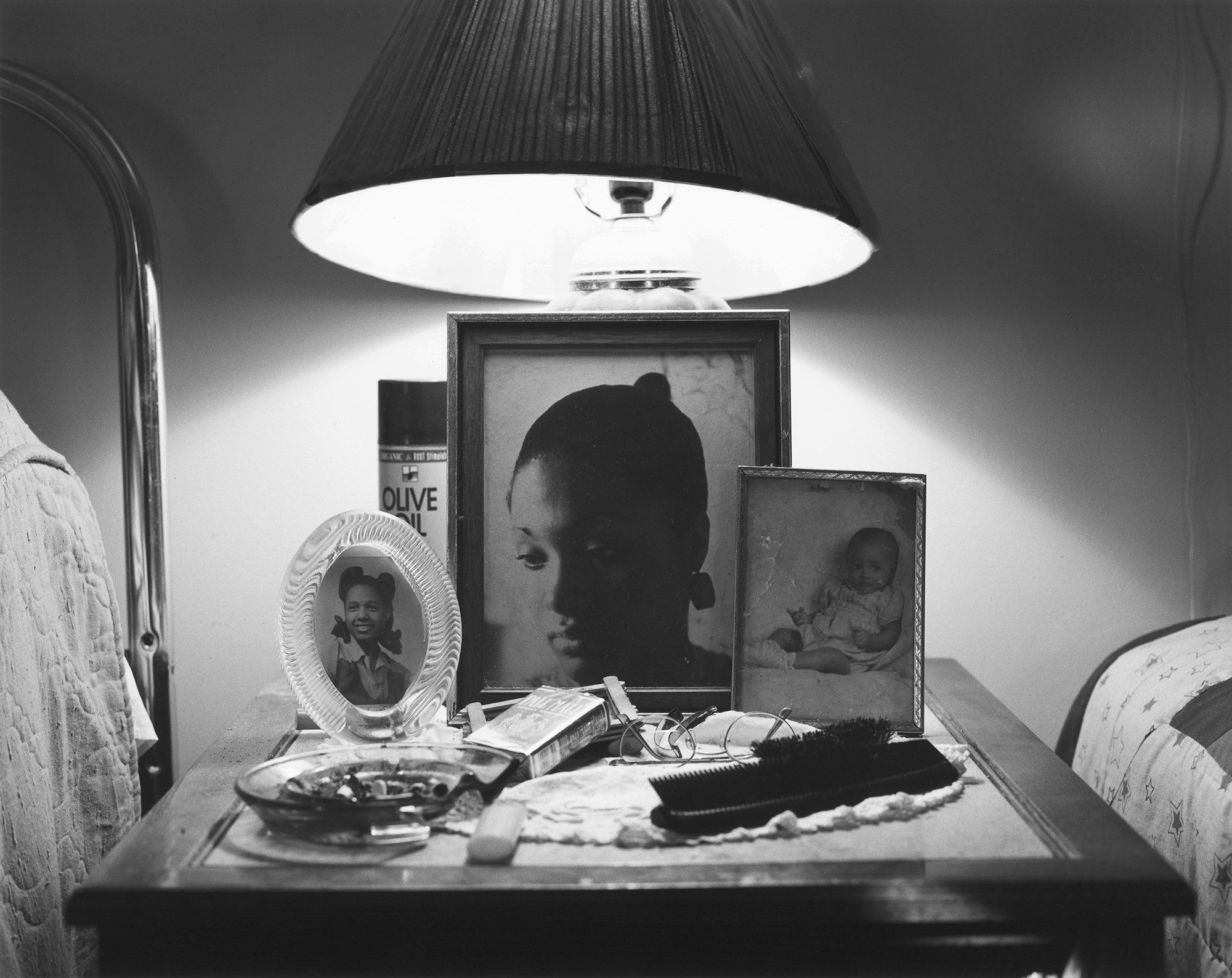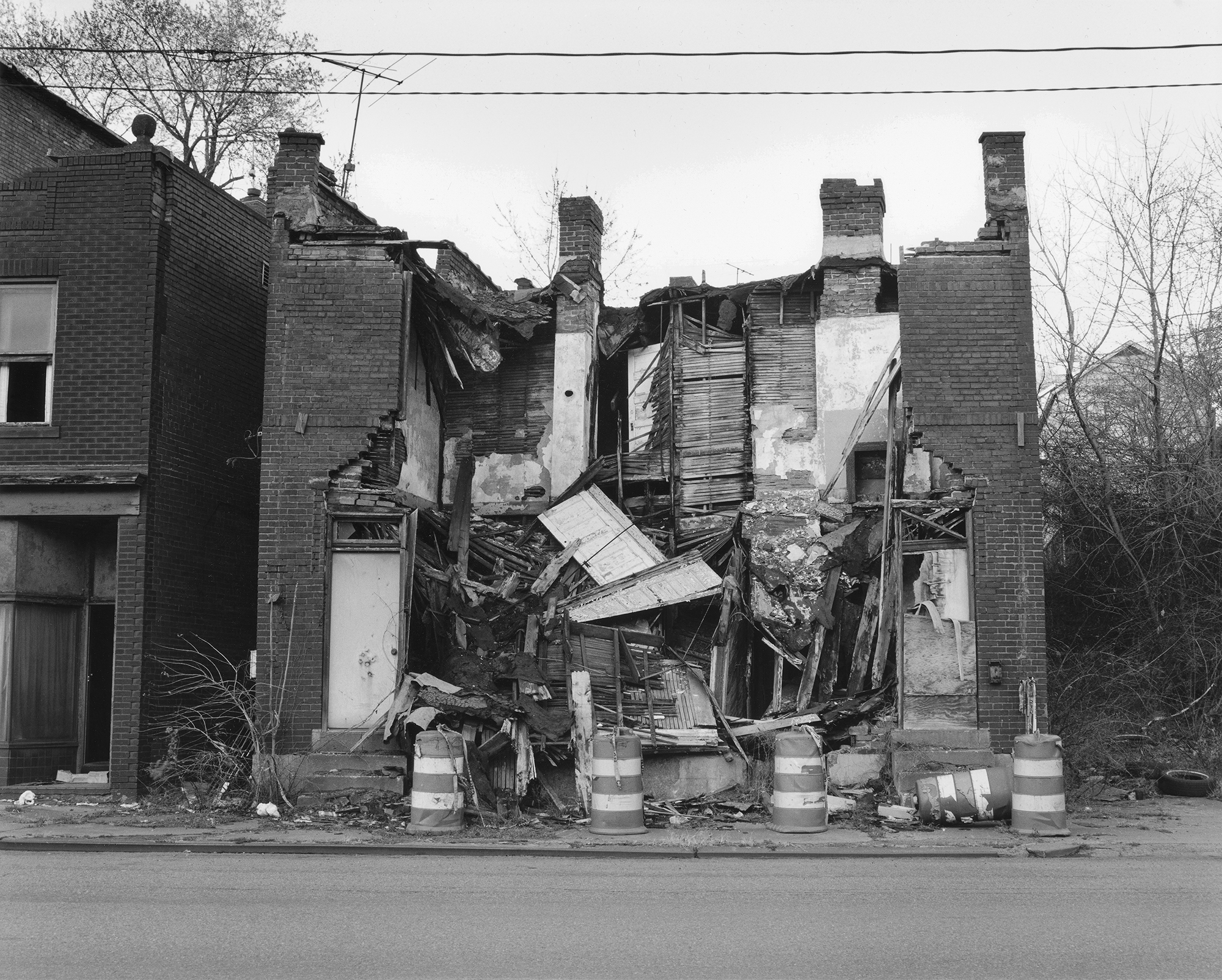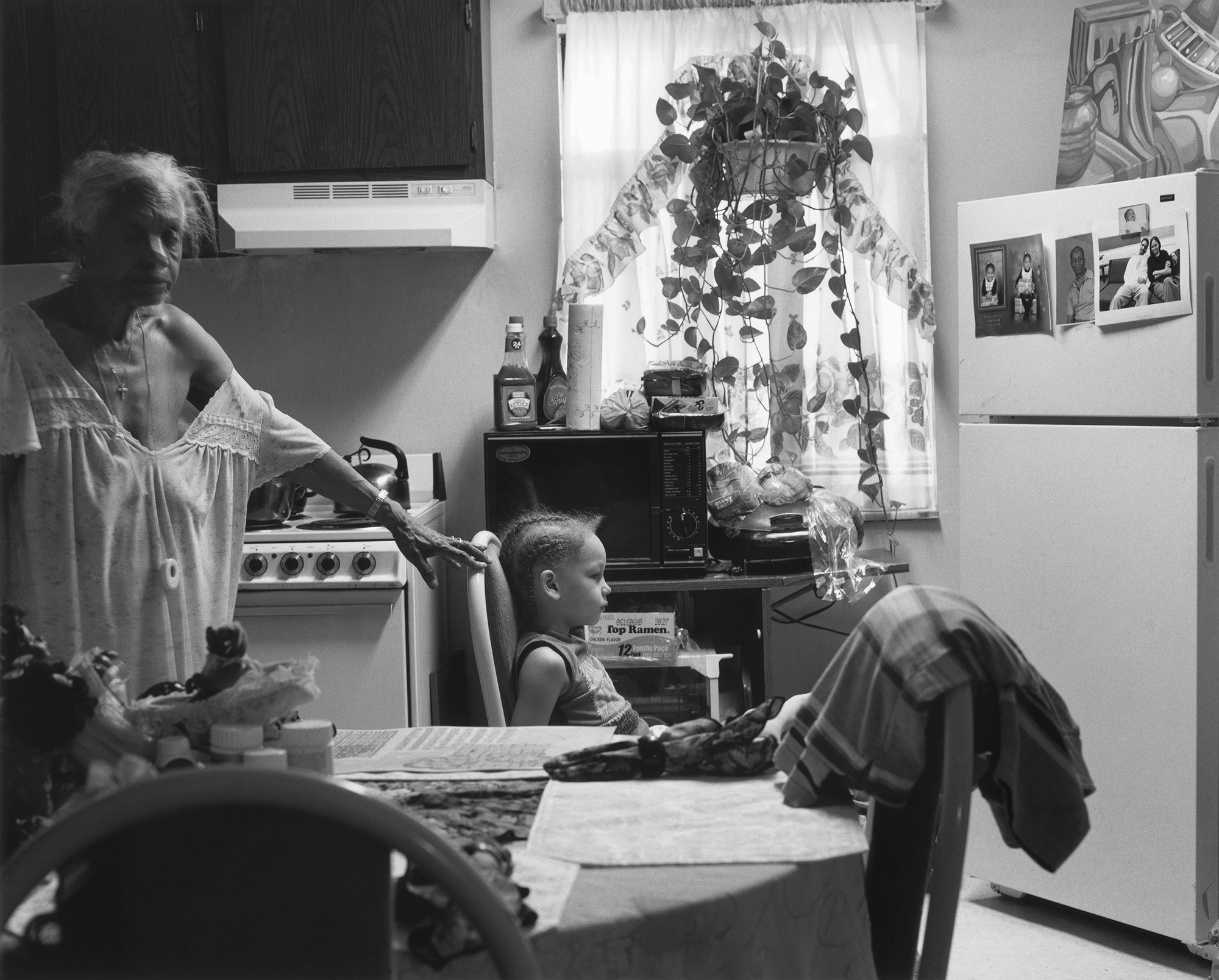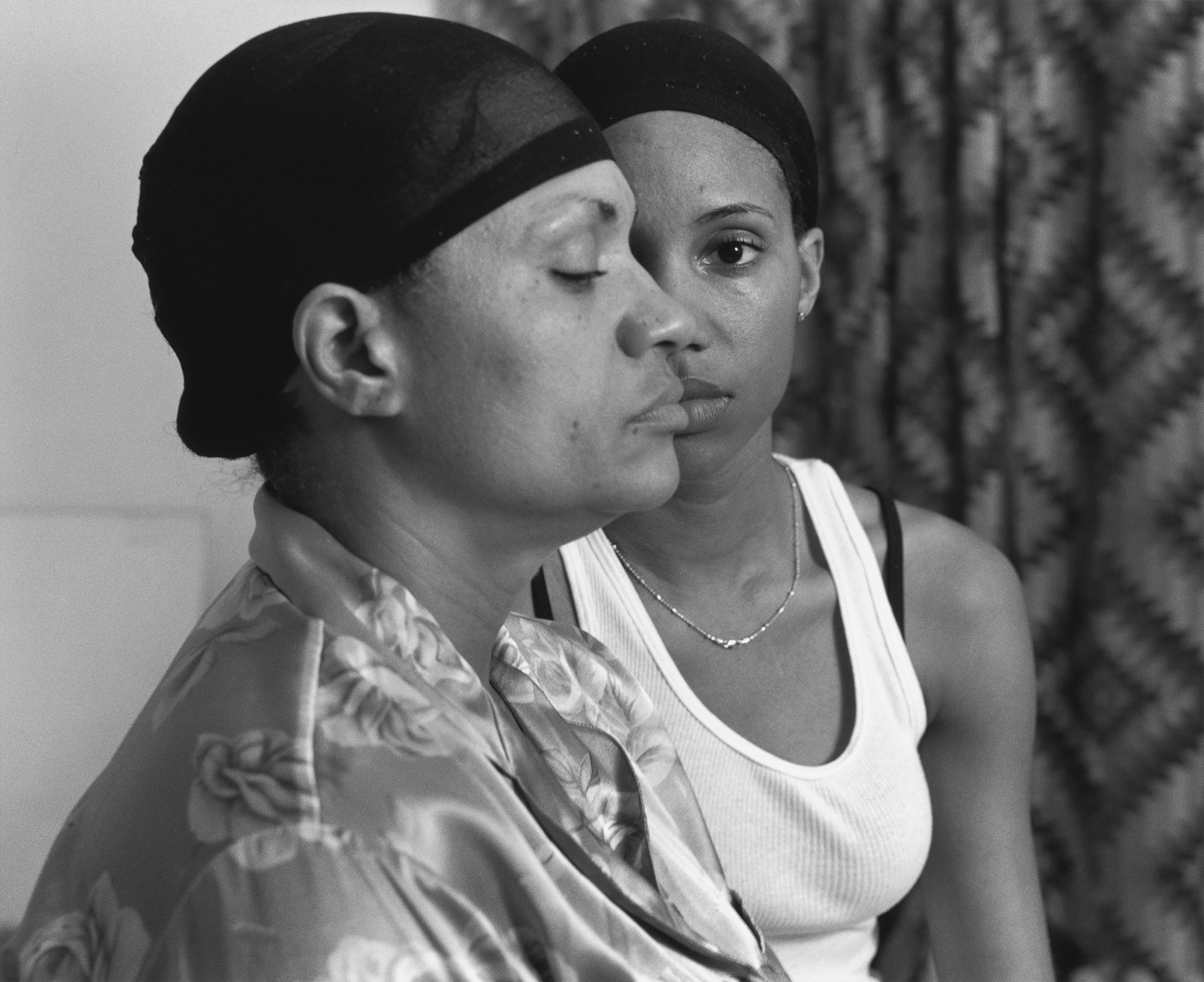【erotice us】
The erotice usNotion of Family
Look

Aunt Midgie and Grandma Ruby, 2007.
LaToya Frazier’s first monograph, The Notion of Family, documents the decline of Braddock, Pennsylvania—a once-prosperous steel-mill town that employed generations of African American workers—alongside the hardships of Frazier’s family, who grew up there. Issues of class and race underscore the mostly black-and-white photographs in the collection, which is arranged as a kind of family album: intimate, collaboratively produced portraits of Frazier and her mother in mirrors and on beds, are presented with derelict scenes of collapsed buildings, vacant lots, and boarded-up stores.
Frazier provides short texts with each image—wistful snippets of memory and anecdote merge with facts and statistics. Illness is nearly a constant. As Laura Wexler points out in an accompanying essay, Braddock’s hospital, which eventually housed the town’s only restaurant and therefore became its de facto meeting place, “is as much or more a fixture in this album and this family than the school, the factory, the library, the market, the taxi stand, the pawnshop, or any other institution.”

Home on Braddock Avenue, 2007.
A particularly poignant grid of color photographs chronicles the long-term effects of exposure to toxic metals atomized in the air and spread downwind from a nearby mill, still in use. Frazier describes the results of an ionic foot detox that she and her mother tried: “My water was lighter, slightly translucent with a large amount of brownish orange yeast debris, thin lymphatic mucus, and black chips of heavy metals floating on top … Areas cleansed: liver, gall bladder, kidneys, intestinal tract, and the lymphatic system … Mom’s water was pretty dark with thick lymphatic mucus, indicating a congested liver and shredded lettuce-like particles from her intestinal track.”
The Notion of Familygilds its often grim truths with the hope of resistance, as in Frazier’s portraits of her Grandma Ruby—with her battalion of dolls, a stoic countenance, and a matriarchal sense of duty—who raised six children by herself on a Goodwill manager’s salary. In one photograph, she stands in her kitchen, her arm resting on the back of a chair where her grandson sits, light from the adjacent window pouring through a scrim of curtain and ivy, her nightgown slipping from her shoulder, her home a picture of order and cleanliness. “Grandma Ruby’s interior design was a firewall that blocked external forces,” Frazier writes.

Grandma Ruby and J.C. in Her Kitchen, 2006.

U.S.S. Edgar Thomson Steel Works and Monongahela River, 2013.
People in Braddock depended on the prosperity of the steel mills. Grandma Ruby’s stepfather worked for his entire life in Andrew Carnegie’s steel mill, the Edgar Thomson Steel Works, “tearing down and rebuilding furnaces, cleaning up spilt metal and slag”; he eventually collected a pension, though as Frazier reminds us with an image of Grandma Ruby wiping his behind as he leans out of a wheelchair, the labor wrecked his body. Dennis C. Dickerson, who contributed another essay to the book, writes: “As long as black men offered their bodies to the enormous physical rigors required of mill labor and their wives and children breathed the contaminated air filling Braddock skies, Edgar Thomson made it possible for laborers to buy homes, educate their youth, and plan for the future.”
Throughout the book, Frazier invokes the specter of iconic Depression-era images from the Farm Security Administration, such as Dorothea Lange’s “Migrant Mother” (1936); Frazier has openly wondered what Florence Owens Thompson, Lange’s subject, might’ve said had she been invited to collaborate in documenting her family’s plight. Self-determination rarely figures in the social documentary tradition, and in many ways Frazier’s work seeks to redress this omission. That she defines her photography as a “conceptual documentary” practice speaks to her continued faith in the camera as a vehicle for both social change and aesthetic possibility: beauty, in her work, does not preclude protest any more than education presumes awareness.
“One of my goals is to disrupt the privileged point of view that only educated and elite practitioners can create work about the poor or disenfranchised,” she tells the artist Dawoud Bey in their interview for the book. “My mother did not have to read Roland Barthes to understand death in a photograph.”

Momme, 2008.

1980s “Welcome to Historic Braddock” Signage and a Lightbulb, 2009.
Jane Harris’s writing has appeared in Art in America, Artforum, Time Out New York, The Village Voice, The Believer, and elsewhere.All photographs © LaToya Frazier and courtesy of Aperture Publishing
Search
Categories
Latest Posts
Apple, Google pressured to drop Saudi app that tracks women
2025-06-27 07:48'Anthem' players are angry about long load times but there's a fix
2025-06-27 07:43What do all of the 2016 Nobel Prize winners have in common?
2025-06-27 07:13Sinner vs. de Minaur 2025 livestream: Watch Australian Open for free
2025-06-27 06:05Popular Posts
Best spring break deal: Southwest flights start at just $69
2025-06-27 08:27Donald Trump just told Florida to vote on the wrong day
2025-06-27 07:40Doug the Pug is in London and he's having the best time ever
2025-06-27 07:20NYT mini crossword answers for January 3, 2025
2025-06-27 06:13Featured Posts
Xbox Elite Series 2 controller deal: Get it at its lowest price ever
2025-06-27 07:24The Trump allegations have sparked a grim new Twitter trend
2025-06-27 06:45J.J. Abrams shares touching new photo from 'Star Wars: Episode IX'
2025-06-27 06:33Popular Articles
Advertisers look to commiserate with disenchanted voters
2025-06-27 08:27Man creates offensively cute 'Harry Potter' pensieve for his wedding
2025-06-27 06:47Optogenetics: A Virtual Reality System for Controlling Living Cells
2025-06-27 06:34Newsletter
Subscribe to our newsletter for the latest updates.
Comments (927)
Opportunity Information Network
Australia vs. India 2024 livestream: Watch 4th Test for free
2025-06-27 08:11Imprint Information Network
Mike Huckabee likens Trump to Captain Quint and Hillary to Jaws, forgets Jaws won
2025-06-27 07:52Wisdom Information Network
Amazon backs Rivian, the Tesla rival behind a new electric truck and SUV
2025-06-27 07:51Transmission Information Network
Facebook might have to pay billions of dollars in fines to FTC for privacy violations
2025-06-27 06:35Leadership Information Network
How to unblock Pornhub for free in Nebraska
2025-06-27 06:29